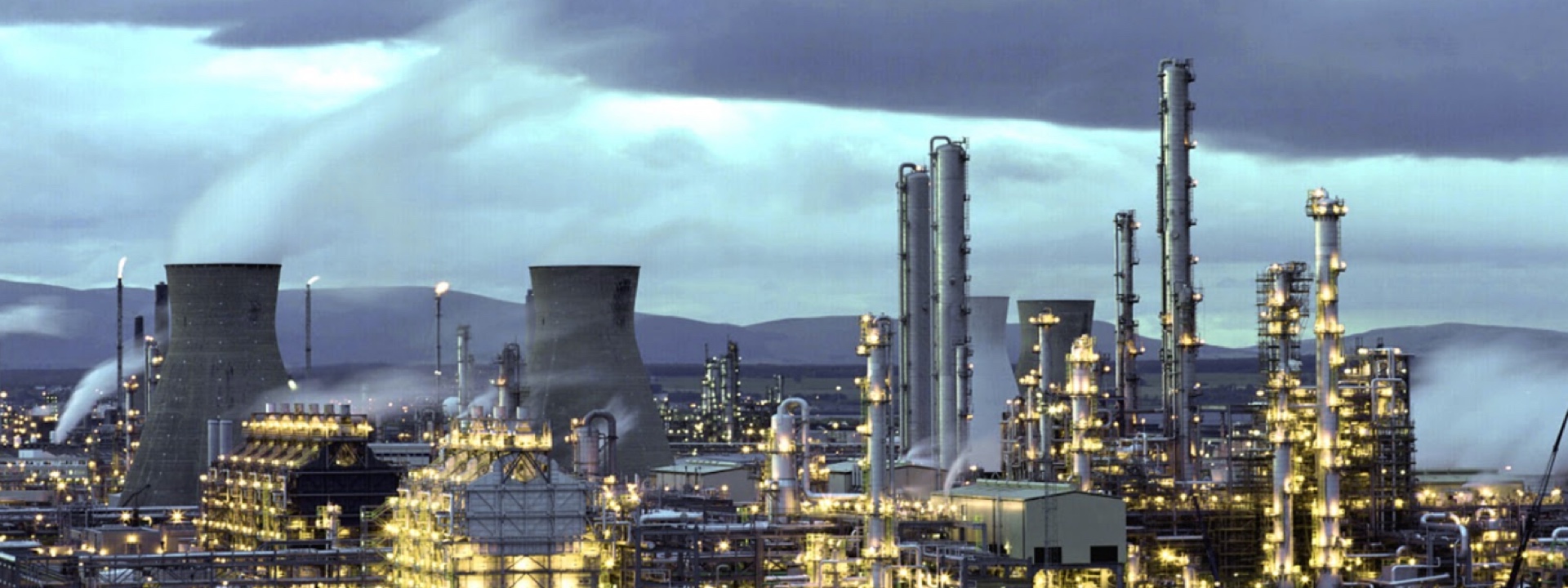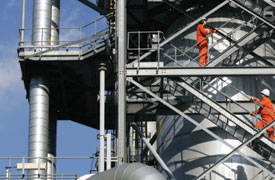Careers
Interested in joining a winning team? A team whose employees share in the ownership of the business and are empowered to make a difference?

Our world-scale petrochemical plants make around 1.4 million tonnes per annum of product, used as the building blocks in the manufacture of household items that society depends upon every day.

 Grangemouth is one of INEOS’ major manufacturing sites.
Grangemouth is one of INEOS’ major manufacturing sites.
Our world-scale petrochemical plants make around 1.4 million tonnes per annum of product, used as the building blocks in the manufacture of household items that society depends upon every day. These include ethylene, propylene and polymers: polyethylene and polypropylene.
Our products are used extensively in the petrochemical industry and transformed into bottles and pipes, cabling and insulation, food packaging and are used in the pharmaceutical industry.
We are also home to a fuels terminal, facilitating the delivery of the bulk of fuels used at forecourts and aiports across Scotland.
By Train
Polmont is the nearest station to site ~ 40 minutes walk. The train journey from Edinburgh takes ~30 minutes; from Glasgow ~25 minutes.
By Road
The Grangemouth site is located 25 miles west of Edinburgh, one mile north of the M9.
Heading northbound from Edinburgh, leave the M9 at Junction 5, signposted Grangemouth/Falkirk; from Glasgow/ Stirlingleave at Junction 5 signposted Grangemouth Industry/Bo'ness.
Please note: if using SATnav, the closest residential postcode is FK3 9UR
By Air
Glasgow Airport is ~40 miles from the Grangemouth site; Edinburgh Airport is ~20 miles.
The History of Grangemouth starts in the mid 19th Century, when in 1850, Glasgow scientist Dr James "Paraffin" Young took out a patent for 'treating bituminous coals to obtain paraffine therefrom'. The first oil works in the world were opened in Bathgate in 1851 producing oil from shale or coal.
However, in 1859 the world's first oil well was sunk in Pennsylvania in the USA and, as the price of oil dropped, many Scottish works closed or concentrated production on lubricants, paraffin wax and sulphate of ammonia.
By 1919 the six surviving companies, including Young's Paraffin Light and Mineral Oil Company Limited came together under the management of the newly formed Scottish Oils. In the same year Scottish Oils was acquired by the Anglo-Persian Oil Company, later to become BP.
BP was persuaded by Scottish Oils to locate a refinery near Grangemouth rather than in north-east England due to its flat ground to the east, its transport links and most importantly, the rich vein of labour skilled in shale oil refining.
By 1924 the refinery was in operation. It maintained a throughput of 360,000 tons per year until the outbreak of war in 1939 when imports of oil dwindled and forced it to close. It reopened in 1946 to a world even more hungry for refined oil products. This demand made it essential for economic reasons that the crude oil was utilised completely, and this led to the growth of the petrochemical industry.
In the 1940s, the Distiller’s Company Ltd, was investigating synthetic processes for the production of their alcohols, to replace the traditional process using molasses, due to unreliable supply and cost fluctuations depending on the harvest.
Thus an overlap existed between the needs of both Distillers and BP in their interest in petrochemical development. As a result, a new joint company, British Petroleum Chemicals Ltd., was established in 1947.
It decided to locate its site adjacent to the existing BP Refinery at Grangemouth, which had available feedstock. The petrochemical plants commissioned in 1951, were the first in Europe.
Our pipeline from Finnart Ocean Terminal on the west coast, capable of receiving larger tankers, first imported crude oil in 1951.
BP’s operations at Grangemouth grew over the next twenty years to meet the growing demands for both petrochemicals and fuels.
The advent of a new source of crude oil feedstock in the shape of North Sea Oil in 1975, further increased the opportunities for the site. The Forties Pipeline System has been the key to Grangemouth's continuing success. The fact that it provides direct access to raw materials for refinery and petrochemicals use has been instrumental in maintaining employment, investment and expansion across the whole complex. This provided the advantages previously only experienced in areas such as the Middle East.
In 2004 BP decided to divest its worldwide olefins and derivatives business: this included the refinery and chemical plants at Grangemouth.
In March 2005, the new company created to run this business was named Innovene. In late 2005 UK-based INEOS bought BP's olefins and derivatives business and so began a new chapter in the history of the site.
In July 2011, INEOS’ refining business entered into a joint venture (JV) with Petrochina. This new company, Petroineos, owns and operates the refinery at Grangemouth.
On 27 March 2014, INEOS confirmed TGE as the preferred bidder on the Grangemouth Ethane tank build contract. TGE is well placed to deliver this element of the Grangemouth scope having already undertaken a similar project for INEOS at our facility in Rafnes, Norway.
The Scottish Government provided the business with a £9m Regional Selective Assistance grant.
On 14 May 2014, INEOS O&P UK announced that it had received notification from Falkirk Council that its planning application for the construction of an ethane tank at its Grangemouth site had been approved.
INEOS O&P UK received notification of approval for an infrastructure loan guarantee from the UK Government to the value €285m / £230m on 17 July 2014; this allowed INEOS to raise the funds necessary to invest in a new import terminal.
Grangemouth today employs over 1300 people working on the 700 hectare site.
In 2015, we awarded the contract to construct the new business HQ for the O&P UK business: BAM Construction was appointed principal contractor; announced agreement with Shell ExxonMobil to supply US shale gas ethane from Grangemouth to the Fife Ethylene Plant (FEP) in Mossmorran; we raised the roof on the ethane tank.
In 2016: September we saw the opening of the O&P UK HQ (12 months after construction began), first Dragon ship delivery of US shale gas ethane, commissioning of the ethane storage tank, the restart of KG’s second manufacturing train following mothballing in 2008.
In 2017: October INEOS announced acquisition of the Forties Pipeline System from BP - the acquisition reunites North Sea and Grangemouth assets under INEOS ownership; project announced to replace ageing steam and power plant with a new energy plant (NEP) – community events August 2017.
The Grangemouth site is home to Scotland’s main petrochemical plants.
We have the capacity to produce around 1.4 million tonnes of petrochemicals per annum.
Our petrochemicals are used as intermediates in the manufacture of other chemicals and applications that a modern society demands and has become reliant upon. These applications range from pharmaceuticals to non-drip paints, medical appliances to the lightweight plastics used in the automotive industry.
The petrochemicals produced at Grangemouth keep people in touch, mobile, housed and healthy.